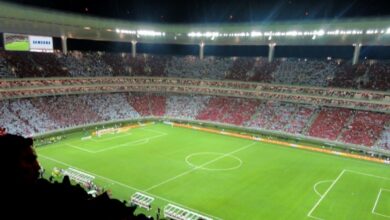Nicaragua: Can Ortega solve the crisis?
Listen this article
Since last Wednesday, President Daniel Ortega is in a dialogue table trying to mediate the crisis

After 10 months in which Nicaragua was mired in a social crisis, in which the Nicaraguans demand the end President Daniel Ortega's term, which has lasted for more than 12 years.
Leer en español: Nicaragua: ¿puede Ortega resolver la crisis?
Since then, the repression of the constant demonstrations has left more than 300 people dead, more than 500 people imprisoned, according to the Nuevo Diario, and more than 2000 people injured, according to the NGO Asociación Nicaragüense Pro Derechos Humanos (ANPDH). Therefore, as already mentioned in a previous article, "those people who speak out against the proposed reforms or against the Ortega government suffer strong repressions, to the point of being violated, imprisoned or even killed by police and paramilitaries. "
Added to the above, is the censorship on different media, which have been censored or closed, and in which several members of the Orteguista police (PO) have taken the newsrooms to control the content that is transmitted.
However, after Carlos Pellas, Roberto Zamora and Ramiro Ortiz, three of the biggest businessmen met with Ortega to discuss the crisis, the Nicaraguan president agreed to establish a negotiating table with the opposition as long as it was not televised, and it was composed of fewer actors. In addition to pressure from businessmen, according to El País, pressure was also added from actors such as the diplomatic lobbying of the Vatican representative in Managua, Stanislaw Waldemar Sommertag, and the United States Embassy in Managua.
Damos a conocer la nota de prensa publicada por los empresarios que sostuvieron la reunión con el Gobierno de Nicaragua, con el acompañamiento del Cardenal Leopoldo Brenes y el Nuncio Apostólico Stanislaw Waldemar. pic.twitter.com/9A4zJrTC3G
— COSEP Nicaragua (@COSEPNicaragua) 18 de febrero de 2019
You may be interested in reading: Nicaragua: a reality not very different from Venezuela
The negotiations
Since February 27, Ortega and the opposition Alianza Cívica began negotiations behind closed doors. As a first measure demanded by the opposition, around 100 people imprisoned by anti-government demonstrations were released on Friday, March 1.
However, the situation of the ex-prisoners does not seem to be very clear at all. Carlos Valle, released from prison and in dialogue with CNN, states that "I have immigration detention, I can not leave the country; I have to present myself once a month to the Penitentiary System".
In addition, although the figure may seem high, according to organizations such as the Inter-American Commission on Human Rights, the 100 people released represent only a small percentage, because, according to figures from the same organization, in Nicaragua, there are 777 people imprisoned as a result of repression during the protests.
Still, the Nicaraguan government says that the official number of detainees is 372 arrests. In this context, the Organization itself affirms that the situation for prisoners is not beneficial, since there are complaints about the violation of human rights, medical attention is not allowed or there are physical attacks against detainees.
"No" to international observers
The opposition, made up of representatives of businessmen, peasants, academics, students and civil society organizations, according to El País, has called for the presence of international observers to ensure that the agreements are fulfilled, because "without guarantors, there is no dialogue".
Given the above, Ortega did not want to give up, because he believes that many of the international organizations are usually not partial in the resolution of conflicts. Due to the above, the dialogues have stagnated in the central points of the negotiations: the advancement of elections, the release of political prisoners, electoral reforms and justice for the victims of repression.
This is why the continuation of the dialogues is fundamental because the country is not only plunged into a social crisis, but is also affected in the economic part. For Daniel Ortega, it is crucial to reach a mediation, since not only the economy of the country has deteriorated, but the international pressure before the resolution of the conflict has increased.
For Carlos Alberto Montaner, CNN analyst, it is possible that the Ortega's regime ends. Montaner argues that "Ortega can no longer keep the national budget afloat, the European Union felt betrayed when he promised to release the prisoners, but instead condemned two peasant leaders to more than 200 years in prison". In addition, he adds that it is possible that during these dialogues Ortega negotiates his departure by advocating impunity for himself, his family and those who followed him in his regime.
Daniel Ortega can solve the crisis in Nicaragua, as long as he accepts the conditions of the opposition, which would allow guarantor organizations to demonstrate compliance with the agreements. Maybe these negotiations will surprise us with the end of the regime.
LatinAmerican Post | Laura Viviana Guevara Muñoz
Translated from "Nicaragua: ¿puede Ortega resolver la crisis?




